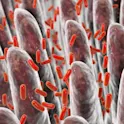
Neuroscience
24 Jul 2017
Elderly yoginis have greater cortical thickness
Elderly female yoga practitioners have greater cortical thickness in the left prefrontal cortex, suggesting that yoga may protect against cognitive decline.

Neuroscience
24 Jul 2017
Elderly female yoga practitioners have greater cortical thickness in the left prefrontal cortex, suggesting that yoga may protect against cognitive decline.

Neuroscience
19 May 2017
New study opens up new area of preventative research for diseases like Alzheimer’s: Targeting age-dependent protein aggregates as possible therapeutic targets.

Health
05 Dec 2016
Research suggests feedback loop between greater executive function and healthy behavior

Health
10 Nov 2016
In a randomized double-blind trial, scientists show for the first time that dietary supplementation with daily dose of probiotic bacteria over a period of just 12 weeks is sufficient to yield a small but significant improvement in the cognitive performance of Alzheimer’s patients. For the first time, scientists have shown that probiotics — beneficial live bacteria and yeasts taken as dietary supplements — can improve cognitive function in humans. In a new clinical trial, scientists show that a daily dose of probiotic Lactobacillus and Bifidobacterium bacteria taken over a period of just 12 weeks is enough to yield a moderate but significant improvement in the score of elderly Alzheimer’s patients on the Mini-Mental State Examination (MMSE) scale, a standard measure of cognitive impairment. Probiotics are known to give partial protection against certain infectious diarrheas, irritable bowel syndrome, inflammatory bowel disease, eczema, allergies, colds, tooth decay, and periodontal disease. But scientists have long hypothesized that probiotics might also boost cognition, as there is continuous two-way communication between the intestinal microflora, the gastrointestinal tract, and the brain through the nervous system, the immune system, and hormones (along the so-called “microbiota-gut-brain axis”). In mice, probiotics have indeed been shown to improve learning and […]

Health
09 Aug 2016
The Mediterranean diet can improve your mind, as well your heart, shows a study published in the open-access journal Frontiers in Nutrition.

Health
24 Jun 2016
Academic, pharmaceutical, healthcare policy and pension fund perspectives. — By Elliott Williams “The fundamental questions of whether aging can and should be classified as a disease are not new, but today they are more pressing than ever for many reasons,” says Dr Alex Zhavoronkov, CEO of Insilico Medicine and Chief Science Officer at the Biogerontology Research Foundation. Gerontology, the study of old age, spans multiple academic fields from economics to social sciences. Biogerontology specifically focuses on those biological process that contribute to aging, as well as the ultimate effects of aging on our health. Insights from biogerontology studies will contribute to public and private medical research, influencing our societal values, and guide policy makers in their decisions. “The main problems in biogerontology are similar to those in drug discovery for most human diseases — but with fewer resources, less visibility and less of a sense of urgency,” says Dr Alex Zhavoronkov. To bring into focus aging as a disease, Dr Zhavoronkov is looking to the future, and the 2018 release of the WHO-curated ICD-11. The ICD (International Classification of Diseases) is an extensive piece of work used at all levels of healthcare management: from physicians to patient organizations, from insurers to policy […]
Get the latest research updates, subscribe to our newsletter